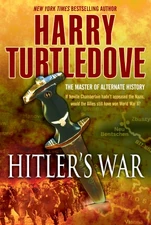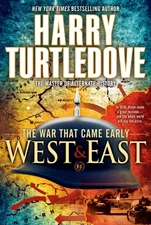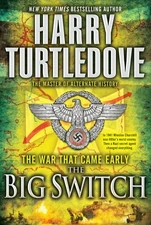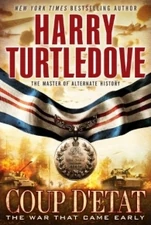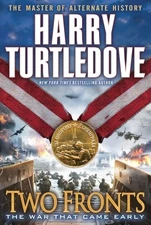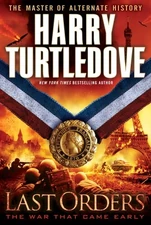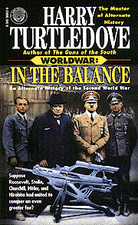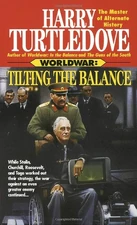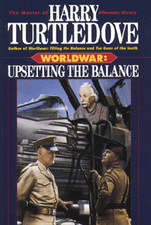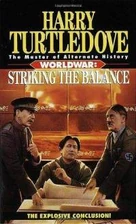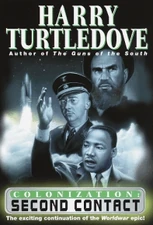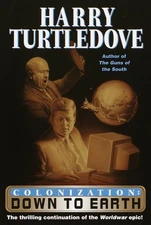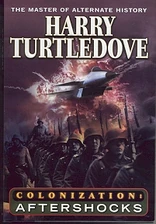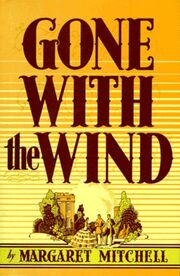
Gone with the Wind is an American novel authored by Margaret Mitchell in 1936. It is an epic historical romance which tells the story of Scarlett O'Hara, the daughter of a planter in Georgia, whose family loses its plantation and much more in the American Civil War. Scarlett struggles to survive the deprivations of the postwar Reconstruction period, with the help of Rhett Butler, a former blockade runner who loves Scarlett.
In 1939, Gone with the Wind was adapted into a film starring Clark Gable and Vivien Leigh, one of the most ambitious and most successful movies of the early 20th century. Among its many honors were ten Academy Awards, a record for most Oscars which held until Ben-Hur won eleven in 1959. It continues to be the highest-grossing domestic film in American history when adjusted for inflation.
In 1989, the United States Library of Congress selected it for preservation in the National Film Registry for being "culturally, historically, or aesthetically significant".
In 1998, the American Film Institute named Gone With the Wind the fourth-greatest film of the 20th century, following Citizen Kane, Casablanca, and The Godfather. Since then, the AFI routinely heaps comparable honors upon the film.
A number of satires, spin-offs, and sequels to Gone with the Wind have been written, both authorized and otherwise.
Gone with the Wind in In the Presence of Mine Enemies[]
The adaptation of Gone with the Wind was reportedly the first Führer Adolf Hitler's favorite film. Consequently, it was re-released in the cinemas of the Greater German Reich every few years into the early 21st century. Susanna Weiss often mocked the film's poor German dubbing.
The popular doll New Orleans Vicki was said to look as if she belonged in Gone With the Wind, even though none of the characters in the film were from New Orleans.[1]
Gone with the Wind in Joe Steele[]
Charlie Sullivan read and enjoyed Gone with the Wind in the late 1930s. He mentioned his enjoyment of the novel to Stas Mikoian, who wondered how a black waiter might have felt about the book. Sullivan allowed that the waiter might want to punch Margaret Mitchell in the face.[2]
Gone with the Wind in Or Even Eagle Flew[]
Amelia Earhart read Gone with the Wind on the train to Montreal.[3]
Gone with the Wind in The War That Came Early[]
Peggy Druce reread Gone with the Wind during her journey from Stockholm to Philadelphia by way of London and New York City in the summer of 1940. Though she had read the book before, she appreciated it for a long journey because it was such a lengthy read. She also reflected that, as the Second World War had stranded her in Europe throughout 1939, she had missed the much-praised film adaptation of the novel. She hoped that it would still be playing somewhere in Philadelphia when she finally returned home.[4]
Gone with the Wind in Worldwar[]
When Mordechai Anielewicz returned home following the Race-German War of 1965, he found that his wife and their three children had been abducted in the chaotic final days of the war, when both Poland and Germany had devolved to anarchy. He followed his family into Germany and eventually found them working as slave labor on Gustav Kluge's large farm in Germany. Remembering having seen Gone with the Wind, he realized that he was seeing not a farm but a plantation.
When Sam Yeager visited Home in 2031, he visited a bookshop in the hope of surveying classics of the Race's literature. He was surprised to find that, by pure coincidence, the Race also had a classic novel titled Gone with the Wind. It was assigned reading in most educational curricula of the Race, including, apparently, that of military leadership; Atvar had been required to read it as a student.
The Race's novel was written around 35,000 BC. It tells the story of friends who part over time, which in the Race's culture is considered equally poignant to the human version's love story. The book is written in an older dialect of the Race's language, with several words that are unfamiliar to modern readers. One of the characters has an audience with the Emperor of the Race.
When Atvar was helping Yeager prepare for his own audience with the Emperor, Yeager mentioned that he remembered one bit of ceremony from Gone With the Wind. He explained to the ex-Fleetlord why he had read it, and the two spent the rest of the afternoon engaged in discussions of comparative literature.
See also[]
- Clark Butler, a minor character in Settling Accounts: In at the Death who is based on Clark Gable as Rhett Butler.
- Thert the Butler, a minor character in The War Between the Provinces: Marching Through Peachtree with the same basic description.
References[]
- ↑ In the Presence of Mine Enemies, pg. 251, HC.
- ↑ Joe Steele, pg. 144.
- ↑ Or Even Eagle Flew, pgs. 1-2, loc. 48-53.
- ↑ The Big Switch ch 5
| ||||||||||||||||
| |||||||||||||||||||
| |||||||
| ||||||||||||||||||||||
| |||||||||||||||||||||||||



